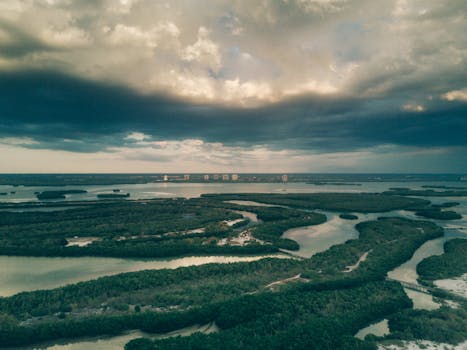
Climate change is one of the most pressing challenges facing our planet today. It affects various aspects of life on Earth, but perhaps its most significant impact is on global ecosystems. The focus keyword here is ‘climate change’, which we will examine in detail to understand its implications on biodiversity and ecosystems.
As global temperatures rise due to increased greenhouse gas emissions, ecosystems are undergoing profound changes. These changes are not only environmental but also threaten the delicate balance of life on Earth. In this article, we will delve into the various ways climate change affects global ecosystems.
Section 1: The Effects of Climate Change on Biodiversity

Biodiversity refers to the variety of life on Earth, encompassing different species, genetic variations, and ecosystems. Climate change poses a significant threat to biodiversity through habitat loss, altered ecosystems, and changes in species distribution. As temperatures rise, many species find it challenging to adapt to the new environmental conditions.
Species that cannot migrate or adapt quickly enough face extinction. For example, polar bears are losing their sea ice habitat, which is essential for their hunting and breeding. Similarly, coral reefs, which support a vast array of marine life, are experiencing bleaching events due to warmer ocean temperatures.
Section 2: Habitat Destruction and Fragmentation

Climate change leads to habitat destruction and fragmentation, which is detrimental to many species. As ecosystems become less stable, habitats can be destroyed by extreme weather events such as floods, hurricanes, and droughts. These changes can isolate species populations, making it difficult for them to interbreed and survive.
For instance, forests that are vital for many terrestrial species are being affected by rising temperatures and changing precipitation patterns. This can lead to increased susceptibility to pests and diseases, further threatening the species that rely on these habitats.
Section 3: Oceanic Changes and Marine Life

The oceans are not immune to the effects of climate change. Rising sea temperatures, acidification, and changing currents are disrupting marine ecosystems. Ocean acidification, caused by increased CO2 absorption, affects shellfish and coral reefs, which are crucial for marine biodiversity.
Moreover, fish populations are shifting towards cooler waters, impacting the fishing industry and the communities that rely on them for sustenance. As marine ecosystems change, the entire food web is affected, leading to unpredictable consequences for global food security.
Section 4: Health of Ecosystems and Human Impact

The health of ecosystems is vital for human survival. Healthy ecosystems provide essential services such as clean air and water, pollination of plants, and climate regulation. As climate change disrupts these systems, humans face increased risks from natural disasters, food shortages, and health issues.
Communities around the world are experiencing the direct consequences of climate change on their ecosystems. For example, communities relying on agriculture are facing challenges due to unpredictable weather patterns, leading to crop failures and economic instability.
Conclusion

In conclusion, climate change has far-reaching impacts on global ecosystems, threatening biodiversity, disrupting habitats, and affecting human health. It is imperative that we take action to mitigate these effects through conservation efforts, sustainable practices, and global cooperation. Only by understanding the profound impact of climate change can we work towards a more sustainable future for our planet.



